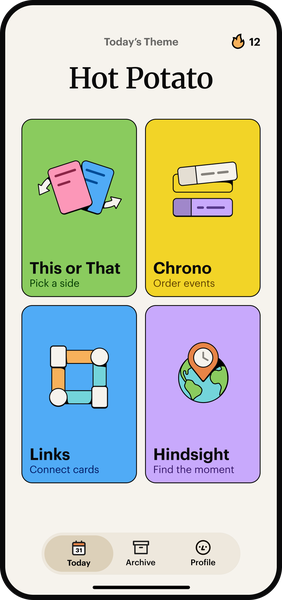
Is your brain ready for a Spark?
The Mind Company
started 15 years ago as MindSnacks, marketing a learning app for kids, then changed its
name soon afterward to Elevate Labs following success of a brain training/mental fitness app called Elevate, and rebranded yet again to its current name just last month. It now launches Spark to
provide daily puzzles designed “to sharpen cognitive skills, refresh memory, and expand worldly knowledge in just a few minutes a day.”
“We want to be the definitive company
that builds products that are good for your brain,” The Mind Company COO Dan Kessler tells Marketing Daily in explaining the recent corporate rebrand. “Now that we were launching
Spark, it was a really good moment to change the name of the company to something that really represented what we’re trying to accomplish.”
advertisement
advertisement
Spark joins not only Elevate, but also
Balance, a six-year-old app for meditation and mindfulness, in The Mind Company’s lineup.
While Elevate focuses on such skills as vocabulary, math, reading comprehension and
memorization, and Balance reaches people who are “either grappling with depression or anxiety or want to sleep better,” Spark is designed as a way for users to “learn new
things,” says Kessler. “Every day has a different theme, with fun and important facts about that topic.”
On Monday, for example, a pre-release version of Spark offered up
“Rebel with a Cause” as the day’s topic. One of four puzzles asked users to place eight events in chronological order, including such events as David Bowie’s release of
“Rebel, Rebel,” Haiti gaining its independence, the release of the James Dean film “Rebel Without a Cause,” and Nat Turner’s rebellion.
Spark is expected to
quickly reach 75,000 downloads, thanks largely to “leaning on…millions and millions of monthly active users” for Elevate and Balance. The company also plans to work with creators
and influencers, and run performance marketing campaigns over Meta and other channels, including in-app ads on mobile games. “We expect to get to mid- to high six figures of active users
in the next several months,” Kessler says.
A “key moment” involving paid advertising, he says, will be Jan. 1, when “people tend to take on a lot of new habits that
make them better.”
While supplements can be seen as one answer for people with cognitive decline or brain fog, Kessler says, another tool is to “directly exercise your
brain.” Otherwise, it’s “like saying you can just drink a protein shake and not go to the gym and build muscle.”
While Elevate and Balance are mostly
subscription-based, Spark is designed as a mostly free app, although a $11.99/year premium version provides some extra features like access to previous puzzles.
Spark may eventually also take
ads on the free side, which The Mind Company is already doing with Elevate, but not with Balance, since “listening to an ad before meditation would not be a great user experience,” says
Kessler.
“Our apps are in what we call the ‘mental fitness’ category, critically important in today’s day and age because cognitive decline is impacting all
generations,” he adds.
He cites studies showing that “constant access to the internet, algorithmic social feeds and now AI are doing a lot of the thinking for us and making
it harder and harder to learn new things, to process information, to think critically.” Since The Mind Company focuses on products that “help mitigate cognitive decline,” he says,
“we view this an opportunity.”
While all the company’s apps appeal to “people looking to improve their minds in some way,” Kessler says that “Elevate might
skew a bit more towards millennials and Gen X-ers who want to be sharper as they age, and Balance seems to be used a lot more by younger moms who get stressed and have a lot of anxiety.”
And Spark? Specific demos are currently hard to pin down, since marketing outside the company’s own base is just starting, “In theory, the market is curious people, no matter the age:
people who like learning new facts, who go to trivia nights or enjoy playing New York Times games or crosswords, who follow TikTok and Instagram creators who talk about history, science,
literature or even pop culture.”
The Times puzzles could also be seen as competition, Kessler notes, “although our games are focused on getting you to learn, whereas The
New York Times games are testing what you already know. You don’t do a crossword or play Wordle or Connections and walk away having learned anything new.”
As for other apps in
the mental health space, Kessler says a key differentiator for The Mind Company is “rigorous testing… to ensure that they work the way we intend.” The company backs up its products
with “a variety of published studies and white papers.”
Another way Spark differs from other apps: the human touch.
“A lot of apps are essentially like AI
wrappers,” Kessler says. “We have a team of really curious humans who develop these games every single day. They do the research…and they painstakingly focus on the copy, the words
and the facts.”
He adds, “right now, the world’s craving that. We don’t want a robot to tell us what’s going on.”